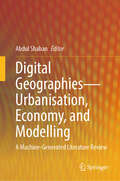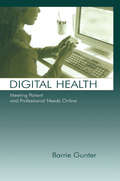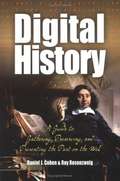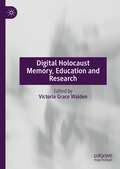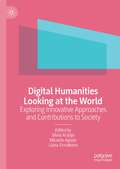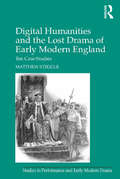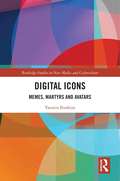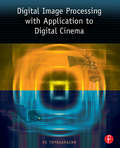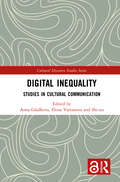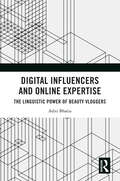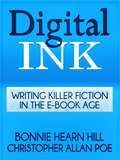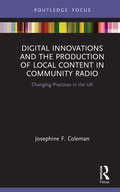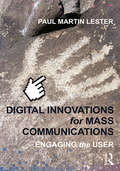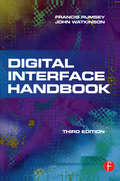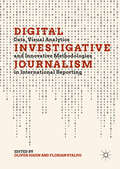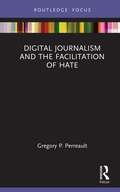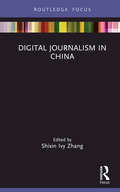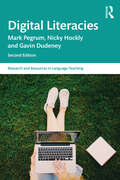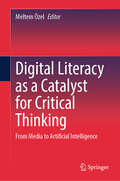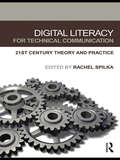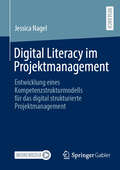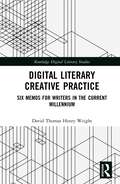- Table View
- List View
Digital Geographies—Theory, Space, and Communities: A Machine-Generated Literature Review
by Abdul ShabanThis machine-generated volume, with chapter introductions by the human expert, showcases how digital technologies are having deep transformative impacts on geographies and temporalities of social, political, economic, and personal lives. They are altering perceptions and physicality of space and time. They are giving birth to digital communities and societies where distance remains of little significance. Virtual spaces and ICT have disrupted state sovereignties, often liquidating their physical national boundaries. The rise of the digital economy shows that new important raw materials for the future are information rather than coal, oil, and minerals. Digitalisation is also leading to several contradictory processes of democratisation, rising welfare of the citizens, as well as surveillance, peripheralisation and exclusion. States are taking pride in digitalising their services to the citizens, with massive consequences on the welfare of those facing digital divides. As a departure to, and in addition to, the usual understanding of digitalisation, society, and space, the present volume engages with some of the critical questions while reviewing existing literature: What are the space relations of digital technologies? What are the forms and consequences of changing physical space–human relations to digital-space-human relations? How is the sense of time and space changing with pervasive performatives of ‘in real-time’ and ‘virtual realities’ or with perceptible or portable spaces? In what ways does digitalisation relate to knowledge and power? Why and how must we theorise the digitalisation-led transformative processes of sociality, materiality and their spatialities? The book will be useful for teachers, researchers, and students engaged in this new area of digital geography, especially in social science and its subfields of sociology, economics, political sciences, anthropology, psychology, development studies, policy studies, social work, urban studies, and planning. For the full picture, the volume can be read in combination with its companion volume on ‘Digital Geographies – Urbanisation, Economy and Modelling’.
Digital Geographies—Urbanisation, Economy, and Modelling: A Machine-Generated Literature Review
by Abdul ShabanThis machine-generated volume, with chapter introductions by the human expert, of summaries of the existing studies furthers our understanding of the impact of digitalisation on spaces, their imaginations and representations. It brings out the digital territorial and socio-economic digital modelling and representation methods. The virtual spaces, created by GIS, photoshopping, games, etc., have become an area of interest for many as they produce spatial imaginaries having social, political and individual consequences. It delves into the literature on digital capitalism and how it is giving birth to a new mode of expansionary capitalism to reap the surplus values and profits from peripheries and drain the same to the core. It shows how digitalisation has enabled enterprises to operate from a virtual space with strong spatial networks. Mega digital enterprises together control a trillion-dollar economy having massive consequences for digital labour, welfare of consumers, and development geographies. This book explores some critical questions while generating summaries of existing literature: How do imaginaries, models or virtual realities help us comprehend spatialities? How does capitalism relate to digitalism, and with what consequences? How do the cities and mobilities relate to digitalisation? What are the possibilities of re-configuring the man-environmental relations with digital technologies in view of rising pollution and impending climate change? Teachers, researchers, and students engaged in this new area of digital geography, especially in social science and its subfields of sociology, economics, political sciences, anthropology, psychology, development studies, policy studies, social work, urban studies, and planning, will find the volume very useful. For a full picture, the book can be read in combination with its companion volume on ‘Digital Geographies – Theory, Space and Communities’.
Digital Health: Meeting Patient and Professional Needs Online
by Barrie GunterThis book is concerned with the provision of health information remotely via the latest communications technologies. The rapidly aging population has led governments to seek more effective methods of maintaining high standards of public health through the cultivation of healthy living, as well as improved and more efficiently delivered health advice and diagnostic services. Experiments with remote provision of health information and transactional services have been piloted to assess in this context the efficacy of new communications technologies, such as personal computers linked to the Internet, interactive digital television in the home, and electronically networked touch-screen kiosks in public locations. Such developments represent part of a wider agenda--through electronic government--to cultivate more dynamic democracies and involve citizens of a time of growing political alienation. The impact of such developments can only properly be established through systematic empirical research. This book examines what has been learned from research-based evaluations of digital health projects.It draws upon research from different parts of the world and offers an up-to-date review of the literature in this field. It also presents a detailed account of recent research carried out in Britain on the effectiveness of government-sponsored pilot health information, advice and transactional services provided via kiosks, the Internet, and interactive digital television. It considers the effectiveness of these communications technologies in relation to a range of distinct applications, their use by the public and perceived usefulness and authority, and the potential of remote health delivery to support or supplant more traditional and direct forms of health diagnosis and treatment.The book will be of interest to those involved in the academic study of digital media developments, e-government and remote health, as well as to policy-makers and practitioners working in these rapidly growing fields of endeavor.
Digital History: A Guide to Gathering, Preserving, and Presenting the Past on the Web
by Roy Rosenzweig Daniel J. CohenCohen and Rosenzweig take their experiences with a project at George Mason U. titled "Echo: Exploring and Collecting History Online; Science, Technology, and Industry" and build them into an introduction to the Web for historians who want to produce or improve an online exhibit. They walk readers (teachers, students, activists, curators, amateur enthusiasts) through the process of planning a project, understanding the technologies involved, and responding to an intended audience effectively. Discussion includes coverage of copyright law and fair use for scholars, and of evolving Web techniques that enable interactivity. Annotation ©2005 Book News, Inc., Portland, OR (booknews.com)
Digital Holocaust Memory, Education and Research
by Victoria Grace WaldenThis book explores the diverse range of practical and theoretical challenges and possibilities that digital technologies and platforms pose for Holocaust memory, education and research. From social media to virtual reality, 360-degree imaging to machine learning, there can be no doubt that digital media penetrate practice in these fields. As the Holocaust moves beyond living memory towards solely mediated memory, it is imperative that we pay critical attention to the way digital technologies are shaping public memory and education and research. Bringing together the voices of heritage and educational professionals, and academics from the arts and humanities and the social sciences, this interdisciplinary collection explores the practicalities of creating digital Holocaust projects, the educational value of such initiatives, and considers the extent to which digital technologies change the way we remember, learn about and research the Holocaust, thinking through issues such as ethics, embodiment, agency, community, and immersion. At its core, this volume interrogates the extent to which digital interventions in these fields mark an epochal shift in Holocaust memory, education and research, or whether they continue to be shaped by long-standing debates and guidelines developed in the broadcast era.
Digital Humanities Looking at the World: Exploring Innovative Approaches and Contributions to Society
by Sílvia Araújo Micaela Aguiar Liana ErmakovaThis edited volume explores how digital humanities can address critical societal challenges in social media, health, education, archives, heritage, and the arts. It features contributions from leading scholars and practitioners in various fields, offering a comprehensive overview of the role of digital humanities in addressing pressing social and economic issues. Designed for scholars, researchers, and practitioners in digital humanities, social sciences, arts, and cultural studies, the book highlights the potential of digital technologies to tackle today's most urgent problems, making it a valuable resource for those interested in harnessing digital innovation for societal benefit.
Digital Humanities and the Lost Drama of Early Modern England: Ten Case Studies (Studies in Performance and Early Modern Drama)
by Matthew SteggleThis book establishes new information about the likely content of ten lost plays from the period 1580-1642. These plays’ authors include Nashe, Heywood, and Dekker; and the plays themselves connect in direct ways to some of the most canonical dramas of English literature, including Hamlet, King Lear, The Changeling, and The Duchess of Malfi. The lost plays in question are: Terminus & Non Terminus (1586-8); Richard the Confessor (1593); Cutlack (1594); Bellendon (1594); Truth's Supplication to Candlelight (1600); Albere Galles (1602); Henry the Una (c. 1619); The Angel King (1624); The Duchess of Fernandina (c. 1630-42); and The Cardinal's Conspiracy (bef. 1639). From this list of bare titles, it is argued, can be reconstructed comedies, tragedies, and histories, whose leading characters included a saint, a robber, a Medici duchess, an impotent king, at least one pope, and an angel. In each case, newly-available digital research resources make it possible to interrogate the title and to identify the play's subject-matter, analogues, and likely genre. But these concrete examples raise wider theoretical problems: What is a lost play? What can, and cannot, be said about objects in this problematic category? Known lost plays from the early modern commercial theatre outnumber extant plays from that theatre: but how, in practice, can one investigate them? This book offers an innovative theoretical and practical frame for such work, putting digital humanities into action in the emerging field of lost play studies.
Digital Icons: Memes, Martyrs and Avatars (Routledge Studies in New Media and Cyberculture)
by Yasmin IbrahimThis book offers critical perspectives on the digital ‘iconic’, exploring how the notion of the iconic is re-appropriated and re-made online, and the consequences for humanity and society. Examining cross-cultural case studies of iconic images in digital spaces, the author offers original and critical analyses, theories and perspectives on the notion of the ‘iconic’, and on its movement, re-appropriation and meaning making on digital platforms. A carefully curated selection of case studies illustrates topics such as phantom memory; martyrdom; denigration and pornographic recoding; digital games as simulacra; and memes as ‘artification’. Situating the notion of the iconic firmly within contemporary cultures, the author takes a thematic approach to investigate the iconic as an unstable and unfinished phenomenon online as it travels through platforms temporally and spatially. The book will be an important resource for academics and students in the areas of media and communications, digital culture, cultural studies, visual communication, visual culture, journalism studies and digital humanities.
Digital Image Processing with Application to Digital Cinema
by KS ThyagarajanWith crystal clarity, this book conveys the most current principles in digital image processing, providing both the background theory and the practical applications to various industries, such as digital cinema, video compression, and streaming media.
Digital Inequality: Studies in Cultural Communication (Cultural Discourse Studies Series)
by Shi-Xu Anna Gladkova Elena VartanovaTracing the development of new technological skills and digital cultures, this book looks at the rise of new digital divides and reveals how these inequalities affect cross-cultural communication from a cultural discourse studies perspective in various ethnic and cultural groups across the world.The authors discuss the development of multicultural societies across the globe under new challenges brought by digitalization, such as digital exclusion, new professional and personal demands in terms of digital engagement. In addition to highlighting digital inequalities in access, use and benefits of using ICTs, case studies from different national contexts demonstrate the ways minority ethnic and cultural groups are adapting to the new digital environment; explore the transformations that multicultural affairs and communication undergo in the new digital setting; and analyse policy measures aimed at fostering digital inclusion of minor groups. The book advances knowledge of the digital divide, showing its development from a technological access- and skill-based problem into a social and culture-oriented one.This resourceful text will be of interest to students and scholars of social inequality, digital media and communication studies and anyone interested in learning how multicultural discourses are developing in varied national contexts today.
Digital Influencers and Online Expertise: The Linguistic Power of Beauty Vloggers
by Aditi BhatiaBased on data from beauty vlogs published by well-known YouTubers, Bhatia explores how they discursively negotiate multiple identities in a creative and participatory space, giving rise to complexities in the definition of categories such as expert, layperson, learner, and teacher in fluid and dynamic digital contexts. In this insightful book, Bhatia sets out to investigate the interdiscursive construction of identity on YouTube. Taking a multi-methodological approach to Critical Discourse Analysis, Bhatia examines beauty vlogs at the levels of sociocognition, language, and genre to provide a better understanding of some of the measures of success and effect as well as new practices of expertise in online communication. The book contributes to a better understanding of how young people work online, often collaboratively, to conform to or resist mainstream notions of expertise, authenticity, race, and beauty, as well as the linguistic and semiotic tools they use to perform their identity, in order to become digital entrepreneurs and cultural influencers. Students and scholars in the field of discourse analysis, situated within the contexts of popular culture and social media, will find this book a valuable read. This volume also enhances the everyday person’s understanding of the complexities of new media communication and a new generation of cultural intermediaries.
Digital Ink: Writing Killer Fiction in the E-book Age
by Bonnie Hearn Hill Christopher Allan PoeFrom protagonists and antagonists, to dialogue and conflict, DIGITAL INK is a powerful, succinct, and entertaining book that will dramatically improve any writer's work. Suddenly it's a cinch to publish -- pop your manuscript up online via Amazon's KDP, INScribe, Smashwords, or Pubit! and voilá, you've got an e-book. The number of authors, self-published and otherwise, is exploding. But what everybody seems to be talking about is marketing. They're overlooking the actual writing. There's a lot of talk about the sizzle, and yet scant attention to the steak. This book says hold on a minute! It's not just marketing; it has to be a great book. You have to know how to write. Funny and fast, as a book must be in the digital age, DIGITAL INK takes you through all the basics: dialogue, plot, character development, POV, and more. DIGITAL INK will transform your writing.Praise: "Digital Ink is a MUST READ for unpublished authors, as well as those of us who wish to review our craft. Tried and true techniques that work in any market. --New York Times bestselling author, Kat Martin"Digital Ink is a MUST READ for unpublished authors, as well as those of us who wish to review our craft. Tried and true techniques that work in any market.--New York Times bestselling author, Kat Martin"This book is packed with clear information, advice, and examples that will transform your novel. Before you publish, read this book!"--Jen Calonita, bestselling author of SECRETS OF MY HOLLYWOOD LIFE, SLEEPAWAY GIRLS, and the new series for Young Adults, BELLES
Digital Innovations and the Production of Local Content in Community Radio: Changing Practices in the UK (Disruptions)
by Josephine F. ColemanThis book offers an in-depth analysis of how local community radio practitioners have embraced the digital revolution. Digital Innovations and the Production of Local Content in Community Radio contextualizes the UK model of community radio, before focussing on specific case studies to examine how the use of digital technologies has affected local radio production practices. The book offers an overview of the new technologies, media forms, and platforms in radio production, shedding light on how digitalization is impacting the routines and experiences of a predominantly volunteer-based workforce. The author presents the argument that despite the benefits of digital media, traditional aspects of programme production continue to be of vital importance to the interpersonal relationships and values of community radio. This book will appeal to academics and researchers in the areas of communication, culture, journalism studies, media, and creative industries.
Digital Innovations for Mass Communications: Engaging the User
by Paul Martin LesterIn every field of mass communications—advertising, entertainment studies, journalism, public relations, radio-television-film, tourism, and visual reporting—professionals understand the importance of storytelling. Regardless of whether the finished product is a commercial, an in-depth investigative piece, a public service campaign, an independent documentary, a travelogue, or a collection of photographs, effective storytelling requires a combination of creativity, empathy, and expertise. Through the innovative technologies and techniques described in this textbook, students will learn how to turn passive readers and viewers into engaged and regular users. The sixteen chapters each include a brief introduction, assignments, simple-to-follow step-by-step exercises, and sources for additional information in which users will learn to produce apps, informational graphics, quick response codes, quizzes, simulations, smartphone and table icons, social media campaigns, three-dimensional pictures, and video. Students will work with the following programs: Blogger, Dreamweaver, Excel, Facebook, GeoCommons, Google Maps, Illustrator, Imgur, iMovie, Infogram, iShowU, JavaScript, JustGive, Kaywa, Kickstarter, LinkedIn, Onvert, Photoshop, Pixel Resort, QuickTime, Reddit, Second Life, SurveyMonkey, TheAppBuilder, Twitter, Vizualize, Wikipedia, Word, WordPress, and YouTube. When digital innovations are added to traditional print and screen presentations, a media user is not only allowed to interact with the information but can also physically engage with the story displayed. Giving students the tools they need to transform their storytelling in this manner is the ultimate goal of this textbook.
Digital Interface Handbook (Music Technology Ser.)
by Francis Rumsey John WatkinsonA digital interface is the technology that allows interconnectivity between multiple pieces of equipment. In other words hardware devices can communicate with each other and accept audio and video material in a variety of forms. The Digital Interface Handbook is a thoroughly detailed manual for those who need to get to grips with digital audio and video systems. Francis Rumsey and John Watkinson bring together their combined experience to shed light on the differences between audio interfaces and show how to make devices 'talk to each' in the digital domain despite their subtle differences. They also include detailed coverage of all the regularly used digital video interfaces. New information included in this third edition: dedicated audio interfaces, audio over computer network interfaces and revised material on practical audio interfacing and synchronisation.
Digital Investigative Journalism: Data, Visual Analytics and Innovative Methodologies in International Reporting
by Oliver Hahn Florian StalphIn the post-digital era, investigative journalism around the world faces a revolutionary shift in the way information is gathered and interpreted. Reporters in the field are confronted with data sources, new logics of information dissemination, and a flood of disinformation. Investigative journalists are working with programmers, designers and scientists to develop innovative tools and hands-on approaches that assist them in disclosing the misuse of power and uncovering injustice. This volume provides an overview of the most sophisticated techniques of digital investigative journalism: data and computational journalism, which investigates stories hidden in numbers; immersive journalism, which digs into virtual reality; drone journalism, which conquers hitherto inaccessible territories; visual and interactive journalism, which reforms storytelling with images and audience perspectives; and digital forensics and visual analytics, which help to authenticate digital content and identify sources in order to detect manipulation. All these techniques are discussed against the backdrop of international political scenarios and globally networked societies. This edited volume, written by renowned international media practitioners and scholars, is full of illuminating insights into digital investigative journalism and addresses professional journalists, journalism researchers and students.
Digital Journalism and the Facilitation of Hate (Disruptions)
by Gregory P. PerreaultDigital Journalism and the Facilitation of Hate explores the process by which digital journalists manage the coverage of hate speech and "hate groups," and considers how digital journalists can best avoid having their work used to lend legitimacy to hate. Leaning on more than 200 interviews with digital journalists over the past three years, this book first lays the foundation by discussing the essential values held by digital journalists, including how they define journalism; what values they consider essential to the field; and how they practice their trade. Perreault considers the problem of defining "hate" and "hate groups" by the media, acknowledging journalism’s role in perpetuating hate through its continued ideological coverage of marginalized groups. Case studies, including the January 6 U.S. Capitol siege, the GamerGate controversy, and the Unite the Right rally in Charlottesville, help to elaborate on this problem and illustrate potential solutions. Digital Journalism and the Facilitation of Hate draws attention to the tactics of white nationalists in leveraging digital journalism and suggests ways in which digital journalists can more effectively manage their reporting on hate. Offering a valuable, empirical insight into the relationship between digital journalism and hate, this book will be of interest to students, scholars, and professionals of social and digital media, sociology, and journalism.
Digital Journalism in China (Disruptions)
by Shixin Ivy ZhangThis edited collection brings together journalism scholars from mainland China, Hong Kong, the UK and Australia to address a variety of pressing issues and challenges facing digital journalism in China today. While China shares certain affinities with the digital disruption of media in other settings, its experience and articulation of change is ultimately unique. This volume explores the implications of digital media technologies for journalists’ professional practice, news users’ consumption and engagement with news, as well as the shifting institutional, organizational and financial structures of news media. Drawing on case studies and quantitative and qualitative approaches, contributors address questions concerning: whether China is witnessing ‘disruptive’ or ‘sustainable’ journalism; if, and in what ways, digital technologies may disrupt journalism; and whether Chinese digital journalism converges with or diverges from Western experiences of digital journalism. Digital Journalism in China is an important addition to the literature on digital journalism, comparative media analysis, the Chinese Communist Party’s social media strategies, tabloidization trends, and the conflict between newsroom and classroom in journalism education, and will be of interest to advanced students, scholars, and practitioners alike.
Digital Literacies (Literacies)
by Julia GillenWith our increasing use of digital and online media, the way we interact with these forms of communication is having an enormous impact on our literacy and learning. In Digital Literacies, Julia Gillen argues that to a substantial extent Linguistics has failed to rise to the opportunities presented by studying language in digital contexts. Assuming no existing knowledge, and drawing from a wide range of research projects, she presents a range of approaches to the study of writing and reading language online. Challenging some of the existing concepts, Digital Literacies traces key ideas through both the history of literacy studies and contemporary approaches to language online, including linguistic ethnography and corpus linguistics. Examples, taken from real life studies, include the use of digital technologies in everyday life, online teenage communities and professional use of Twitter in journalism. Within each chapter, the relevant research methods used are explored and then tied to the theory underpinning them. This book is an innovative and essential read for all those studying and researching applied linguistics, particularly in the areas of literacy and multimodality, at an upper undergraduate and postgraduate level. The title will also be of interest to those working with new media in the fields of Media and Communication Studies, Cultural Psychology, and Education.
Digital Literacies (Research and Resources in Language Teaching)
by Mark Pegrum Gavin Dudeney Nicky HocklyDramatic shifts in our communication landscape have made it crucial for language teaching to go beyond print literacy and encompass the digital literacies which are increasingly central to learners' personal, social, educational and professional lives. By situating these digital literacies within a clear theoretical framework, this book provides educators and students alike with not just the background for a deeper understanding of these key 21st-century skills, but also the rationale for integrating these skills into classroom practice. This is the first methodology book to address not just why but also how to teach digital literacies in the English language classroom. This book provides: A theoretical framework through which to categorise and prioritise digital literacies Practical classroom activities to help learners and teachers develop digital literacies in tandem with key language skills A thorough analysis of the pedagogical implications of developing digital literacies in teaching practice A consideration of exactly how to integrate digital literacies into the English language syllabus Suggestions for teachers on how to continue their own professional development through PLNs (Personal Learning Networks), and how to access teacher development opportunities online. This book is ideal for English language teachers, English language learners of all ages and levels, academics and researchers of all age groups and levels, academics and students researching digital literacies, and anyone looking to expand their understanding of digital literacies within a teaching framework.
Digital Literacies (Research and Resources in Language Teaching)
by Mark Pegrum Gavin Dudeney Nicky HocklyDramatic shifts in our communication landscape have made it crucial for language teaching to go beyond print literacy and encompass the digital literacies which are increasingly central to learners' personal, social, educational and professional lives. By situating these digital literacies within a clear theoretical framework, this book provides educators and students alike with not just the background for a deeper understanding of these key 21st-century skills, but also the rationale for integrating these skills into classroom practice. This is the first methodology book to address not just why but also how to teach digital literacies in the English language classroom. This book provides: A theoretical framework through which to categorise and prioritise digital literacies Practical classroom activities to help learners and teachers develop digital literacies in tandem with key language skills A thorough analysis of the pedagogical implications of developing digital literacies in teaching practice A consideration of exactly how to integrate digital literacies into the English language syllabus Suggestions for teachers on how to continue their own professional development through PLNs (Personal Learning Networks), and how to access teacher development opportunities online This book is ideal for English language teachers and learners of all age groups and levels, academics and students researching digital literacies, and anyone looking to expand their understanding of digital literacies within a teaching framework.
Digital Literacy as a Catalyst for Critical Thinking: From Media to Artificial Intelligence
by Meltem ÖzelThis book explores the many forms in which literacy—the ability to read and write—can manifest. Media and Information Literacy is the ability to use different types of media in a reliable, intelligent, and responsible manner. The development of literacy competence has occurred in parallel with the developments in the historical period. Different types of media have emerged in the historical process, and accordingly, the competences of individuals have developed and diversified and have had socio-cultural reflections. Media and Information Literacy (MIL) is harmonious because it encompasses the various concepts of connected literacies. These include: media literacy, information literacy, freedom of expression and information literacy, library literacy, news literacy, computer literacy, internet literacy, digital literacy, cinema literacy, games literacy, television literacy, advertising literacy, and other types of literacies. Media and Information Literacy is extremely important today because it enables critical thinking. An individual who is Media and Information literate can distinguish between reliable sources of information, determine the role of media in culture, and be responsible for understanding the impact of mass communication when switching between different media platforms. Media and Information Literacy is considered a set of competencies and skills that are close to the concepts of online and offline media, critical thinking, media use, information and source awareness, digital citizenship, and active participation. In particular, Media and Information Literacy skills are skills that are encouraged to combat social challenges such as misinformation and disinformation, extremism, cyberbullying and online hate speech, various cybercrimes (blackmail, data theft, human rights violations, etc.). Media and Information Literacy is a set of competencies that enable a person to access media, analyze media content, create new media messages, reflect on existing media content, and take action with media.
Digital Literacy for Technical Communication: 21st Century Theory and Practice
by Rachel SpilkaDigital Literacy for Technical Communication helps technical communicators make better sense of technology’s impact on their work, so they can identify new ways to adapt, adjust, and evolve, fulfilling their own professional potential. This collection is comprised of three sections, each designed to explore answers to these questions: How has technical communication work changed in response to the current (digital) writing environment? What is important, foundational knowledge in our field that all technical communicators need to learn? How can we revise past theories or develop new ones to better understand how technology has transformed our work? Bringing together highly-regarded specialists in digital literacy, this anthology will serve as an indispensible resource for scholars, students, and practitioners. It illuminates technology’s impact on their work and prepares them to respond to the constant changes and challenges in the new digital universe.
Digital Literacy im Projektmanagement: Entwicklung eines Kompetenzstrukturmodells für das digital strukturierte Projektmanagement
by Jessica NagelUnternehmen und Branchen sehen sich zunehmend mit den Herausforderungen steigender Marktkomplexität, Zeitdruck und wachsender Kundenansprüche konfrontiert. In Reaktion darauf setzen sie verstärkt auf die Implementierung, Erweiterung oder Vertiefung des Projektmanagements, um am Markt wettbewerbsfähig zu bleiben und qualitativ hochwertige Lösungen zeitnah anzubieten. Effizientes Projektmanagement ist dabei maßgeblich von den Kompetenzen der Projektmanager*innen abhängig. Dieses Buch widmet sich der Frage, welche Kompetenzen im Kontext des digital strukturierten Projektmanagements in der externen IT- und Unternehmensberatung vonnöten sind. Die Studie ist explorativ, qualitativ und empirisch ausgerichtet. Mithilfe einer umfassenden Literaturrecherche sowie der Durchführung von Fokusgruppen mit Expert*innen und einer kommunikativen Validierung werden die Handlungssituationen und Kompetenzfacetten im Projektmanagement sowie potenzielle Zukunftstrends eruiert. Ziel ist es, Rückschlüsse auf die Auswirkungen der digitalen Transformation auf die notwendigen Kompetenzen im digital strukturierten Projektmanagement zu ziehen. Die gewonnenen Erkenntnisse wurden mittels qualitativer Inhaltsanalyse ausgewertet.
Digital Literary Creative Practice: Six Memos for Writers in the Current Millennium (Routledge Digital Literary Studies)
by David Thomas WrightIn 1985, Italo Calvino proposed six values he deemed crucial to literature as it moved into the next millennium: lightness, quickness, ‘crystal’ exactitude, visibility, multiplicity, and consistency. Using Italo Calvino’s Six Memos for the Next Millennium as structure and methodology, this book conjoins literary studies with creative practice to interrogate, extend/subvert, and then reflect on the aesthetic and structural ambitions of multiple innovative print authors (Italo Calvino, Zadie Smith, William Faulkner, Virginia Woolf, Bernardine Evaristo, Roberto Bolano, Rachel Cusk, Shahriar Mandanipour, W.G. Sebald, Ross Gibson, Han Kang, and J.M. Coetzee) reimagined in new media in order to develop a model for digital literary practice-led research. This work contains four strands that are presented simultaneously. First, this monograph explores the rise of Calvino’s values within the Calvino corpus. Second, this value’s application to a contemporary literary predicament is explored through a digression. Third, conclusions from this interrogation are drawn as they relate to digital literary culture. Finally, the value’s importance is demonstrated through examining/reflecting on contemporary digital literary creative practice – both the author’s own and works created by contemporary writers/artists who have engaged with the digital postmodern.

